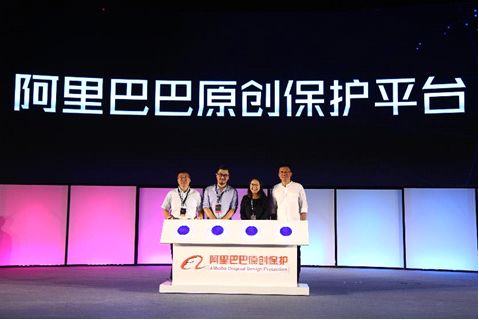


As the internet turns into a battlefield of intellectual property right (IPR) protection, China is ready to sharpen its law enforcement knife on IPR infringement, which is increasingly rampant in the new era.
Speaking at a cybersecurity conference hosted by the Internet Society of China and Alibaba in Beijing on Tuesday, Zhao Jie, an official with the National Copyright Administration (NCA), pointed out that China has already stepped up its efforts in combating IPR violations online at a time when violations are on the rise in the virtual world, including setting up more IPR courts in major cities.
Over half of the new civil lawsuits last year were IPR-related, up some 57.8% compared to 2016, with copyright disputes in games and cyber business models among others. Since 2010, China has launched a month-long anti-piracy campaign every year. The latest one kicked off in July, mainly targeting IPR infringements of short videos, knowledge sharing, audiobooks, and animations, according to the official.
In addition to the nation’s iron-fist policy to combat piracy is society’s increasing recognition that creativity and innovation should be better protected.
Alibaba, the nation’s largest e-commerce platform, announced on Tuesday a scheme to protect the original designs and products being sold on its platform, which saw some 50 million original designs in 2017.

About 100 shops, including the Palace Museum and the National Museum, as well as individual shops like the lady apparel brand, Mukzin, have joined the scheme.
“Shop owners can submit their work, even things like documents, and, once verified, it will be certified as an original product or design by a third-party organization. Like a birth certificate for original products on Tmall. If there is any plagiarism, owners can file a complaint through the system,” Li Xihan, Alibaba’s IPR director, explained.
Feng Guang, CEO of Mukzin, said at the conference that other shops have copied the designs of the young brand since its successful launch in 2014, when its monthly sales increased 300%. “It was more than a loss in terms of cost and sales it was a huge blow to every designer. With Alibaba’s protection scheme, we believe designer brands like us can go global and show the world the real ‘design-in-China,’” Feng said.
Zhao, from NCA, also revealed that IPR protection in cyberspace has been enlisted as part of this year’s legislature work of the National People’s Congress, and authorities are working to push forward the amendment of the current copyright law.
“We believe that internet technology can provide new solutions to IPR protection. We present you the Alibaba-way,” said Sun Jungong, a vice-president of Alibaba and the director of Alibaba’s Intellectual Property Research Institute.
Sun introduced that the group is using AI to monitor its Taobao platform and help prevent IPR violations by detecting violations automatically. Every day, some 600 million to 800 million pictures are scanned by the system, which boasts an accuracy rate of 97.8%.
Earlier on August 10, Wu Da, a cybersecurity expert at Alibaba, also presented the group’s technology for short video copyright protection at Black Hat, a conference known as the “Academy Awards” for white-hat hackers.
As short video platforms usually add watermarks to videos uploaded to the platform, the different watermarks after reposts on different platforms can badly affect the copyright granted to the original designer. In response, Wu Da presented at the summit a technology that can reverse the practice through an ffmpeg filter and an OBS plug-in, which should help keep videos clean from various watermarks.

 Fire brigade in Shanghai holds group wedding
Fire brigade in Shanghai holds group wedding Tourists enjoy ice sculptures in Datan Town, north China
Tourists enjoy ice sculptures in Datan Town, north China Sunset scenery of Dayan Pagoda in Xi'an
Sunset scenery of Dayan Pagoda in Xi'an Tourists have fun at scenic spot in Nanlong Town, NW China
Tourists have fun at scenic spot in Nanlong Town, NW China Harbin attracts tourists by making best use of ice in winter
Harbin attracts tourists by making best use of ice in winter In pics: FIS Alpine Ski Women's World Cup Slalom
In pics: FIS Alpine Ski Women's World Cup Slalom Black-necked cranes rest at reservoir in Lhunzhub County, Lhasa
Black-necked cranes rest at reservoir in Lhunzhub County, Lhasa China's FAST telescope will be available to foreign scientists in April
China's FAST telescope will be available to foreign scientists in April "She power" plays indispensable role in poverty alleviation
"She power" plays indispensable role in poverty alleviation Top 10 world news events of People's Daily in 2020
Top 10 world news events of People's Daily in 2020 Top 10 China news events of People's Daily in 2020
Top 10 China news events of People's Daily in 2020 Top 10 media buzzwords of 2020
Top 10 media buzzwords of 2020 Year-ender:10 major tourism stories of 2020
Year-ender:10 major tourism stories of 2020 No interference in Venezuelan issues
No interference in Venezuelan issues
 Biz prepares for trade spat
Biz prepares for trade spat
 Broadcasting Continent
Broadcasting Continent Australia wins Chinese CEOs as US loses
Australia wins Chinese CEOs as US loses